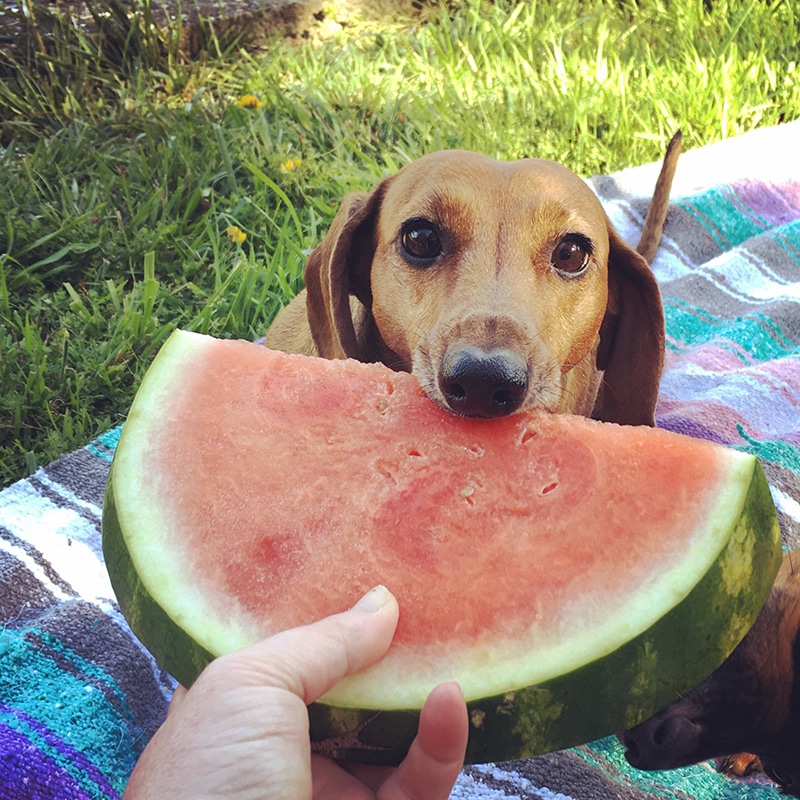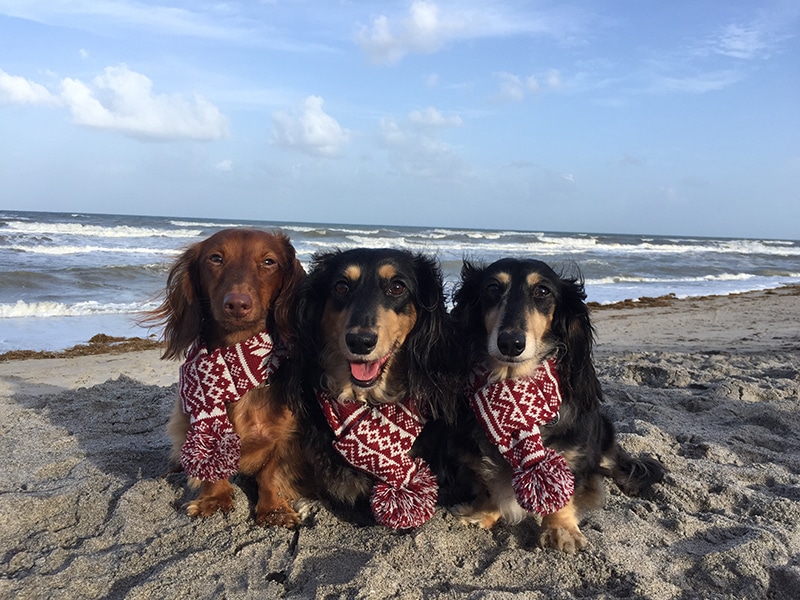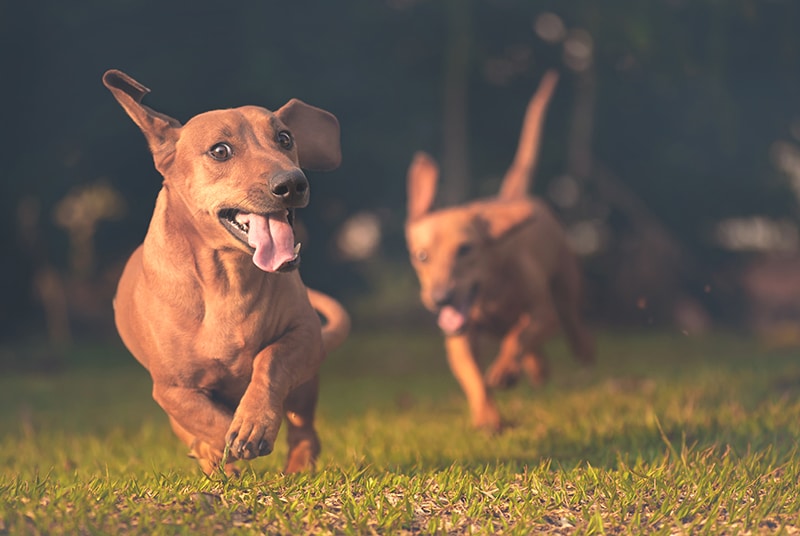Picking the best dog food for your Doxie can be a challenging task. There are plenty of decisions to make. First, you need to consider fido’s life stage and health requirements. Next, you need to ensure that she gets all the proper nutrients from the highest quality sources. All of this with the abundance of information might be overwhelming.
I used my 12 years of Veterinary experience and reviewed over 100 dog food products to find the best dog food for Dachshunds.
After considering the nutritional needs along with genetic health conditions that Dachshunds tend to have, I found that ”Wellness Complete Health Small Breed” is the best overall food for adult Doxies. In addition to meeting my dietary criteria for Doxies, it has the best combination of nutrients and quality sources.
But I understand that no two Doxies are alike, and your Dachshund might have a different life stage or have different needs. That’s why I prepared a shortlist of the best Dachshund foods that address the most common Doxie needs.
In addition to picking the best products for your pooch, I outlined my process for choosing dog food. I want you to know what gets inside the furry stomach. The process is written in plain & simple English that will help you make wiser dietary decisions for your Doxie.
I encourage you to read our review process and check out our in-depth reviews below so that you’ll be able to come up with your own dietary decisions.
Let’s get started.
Before You Pick The Best Food For Your Dachshund

There’s no such thing as one food that fits all Dachshunds. While I did my best to find the best food for most Dachshunds, you might prefer to pick a more specific formula.
That’s why I elaborate here our main considerations while reviewing the best dog foods for Dachshunds.
You can divide your research journey into 3 steps:
- First, pick the right food for your Doxie’s life stage – Puppies, Adults, and Senior Doxies are in different development stages. Their joints, bones, and muscles develop at a different pace. That’s why you’ll need to pick the proper nutrients in the correct quantity for your Weiner’s life stage.
- Picking the right food to reduce common Dachshund health issues – Each dog breed has an increased risk of catching certain health conditions. These health conditions are genetic, and Doxies are not indifferent. So make sure to pick the right ingredients to support common Dachshund health issues.
- Picking suitable nutrient sources – Sometimes, two dog foods might seem similar. Both could provide the same nutritional value. However, it’s essential to question how these nutrients were sourced. We want to avoid chemicals and low-quality nutrients that can introduce some side effects.
The rest of the guide will show you how to pick the right food for your Weiner’s life stage, how diet helps in common Doxie health issues, and what to look for on the label.
For your convenience, I (Dr. Libby Guise) shortlisted 14 dog foods. These foods were carefully selected and should satisfy your Doxie’s needs. I also noted which food is best for certain life stages or particular health issues.
After going through the shortlist, you can find additional considerations that might be of interest to you and your fur-baby.
Finally, I answered the most popular questions that I’m being asked regarding Dachshunds’ nutrition and diet.
Please keep in mind, while I tried to do my best to find the best food for your Weiner, it would be a good idea to understand how and why we made our decisions.
The recommendations in this review are not intended to replace the doctor-patient relationship. Always consult your veterinarian before making significant adjustments to your furbaby’s diet.
The Right Diet For Puppies, Adults, And Senior Dachshunds

With their powerful, short legs and elongated body, Dachshunds are known as active, mischievous, and social pups.
When looking for the best dog food for dachshunds, it’s essential to address the nutritional needs as doxie grows up. Doxie pups and grandpups have different needs (besides being hungry 🙂 ), and we want to support that.
Dietary and Nutritional Considerations for Dachshunds
Whether you have a miniature or standard “wiener dog,” these pooches have fairly simple nutritional needs. But don’t let the small size fool you. They tend to have a high metabolism and require calorie-dense food to fuel their lifestyle. The best way to give them the energy they need is to feed a high-protein (at least 22% for puppies and 18% for adults), moderate-fat (12-15%) diet that comes primarily from animal sources. For seniors, you may need to focus on lower-fat food to compensate for decreased energy levels.
Even with the high energy needs, be careful that you don’t overfeed your furbaby. They can gain too much weight rapidly and become obese. Extra pounds are an enemy for these diminutive pups and can stress the joints and bones. Provide digestible fibers from whole foods such as fruits and vegetables. These dogs can suffer from grain and other food allergies, so avoid common allergens such as corn, wheat, soy, and gluten.
Other helpful macronutrients for your Dachshund include
- a balanced blend of essential vitamins and minerals
- Probiotics for easier digestion
- Omega fatty acids to support brain, coat, and skin health
- Glucosamine and chondroitin for joint maintenance
Calorie Requirement of Dachshunds
- Puppies – Your puppy’s requirements will change as they grow and increase in weight. Use a small breed puppy food and follow package instructions for a starting point. As long as you can see a waistline and feel the ribs through a thin layer of fat on your pooch, you should be good. If your pup gets too thin or too pudgy, adjust their meal sizes.
- Adults – Active adults require an average of about 900 calories per day (or about 40 calories per pound of body weight. More sedentary pups will need around 575 calories per day.
- Seniors – Dachshunds tend to slow down and become less active in their senior years. Start with about 475 calories per day and adjust as needed to maintain healthy lean muscle mass.
Feeding Quantity & Frequency
As long as you’re feeding a brand that’s formulated for small-breed dogs, you can follow package guidelines for the amount of food to give your furbaby. Adjust the volume accordingly if your pup is getting too thin or too fat.
Feeding frequency by life stage:
- Puppies – With the smaller frame and high metabolic rate, puppies need a consistent supply of nutrients throughout the day. We recommend you feed your youngster four meals spread evenly throughout the day to help fuel their growth and activity needs.
- Adults/Seniors – Feed full-grown Dachshunds three times a day to help ensure a steady supply of energy and to prevent drops in blood sugar.
The Appropriate Nutrition For Common Dachshund Health Issues

Some health conditions are more popular among Dachshunds than other dog breeds. Each breed inherits some genes that can be associated with certain health issues.
It doesn’t mean that Fido is going to develop these conditions. It just means that Dachshunds have a higher chance as compared to other breeds.
However, it’s possible to reduce the risk by proactively feeding Doxie with the right nutrients. Here we list the most common Dachshund health issues and how certain nutrients can reduce risk.
A quick reminder: if you think your special pal suffers from any of these conditions, schedule an exam with your veterinarian to confirm your suspicions. Even with healthy dogs, these dietary recommendations may help prevent future problems. Always check with Fido’s doctor before making changes in his diet.
Eye Problems
Dachshunds can be genetically prone to a list of eye diseases that include cataracts, corneal dystrophy, glaucoma, and progressive retinal atrophy. While you may not be able to prevent the conditions, the diet may help slow the progress. Foods that are rich in omega fatty acids, Vitamin A, antioxidants, and beta-carotene provide support for your pal’s eye health.
Joint Health
Although small, these pups have a few inherited joint conditions. With a luxating patella, the kneecap is unstable. Dachshunds may also suffer from hip dysplasia in which the hip joint develops abnormally. With both conditions, the bones move too much and rub against the joint cartilage causing damage and pain.
When it comes to joint health, some key nutrients can help to provide support to the bones and joints and may reduce the progression or minimize the symptoms of joint disease. Look for foods with sources of glucosamine and chondroitin.
IVDD (Intervertebral Disc Disease)
With their elongated backs, Dachshunds are prone to IVDD from bulging or ruptured discs between the spinal vertebrae. Pups with IVDD may show hind limb weakness or lameness, unwillingness to move or jump, or paralysis.
The most important way that diet can help prevent or manage IVDD is by helping your pal to maintain a healthy weight. Look for a high-protein food to support healthy lean muscle mass that’s also low to moderate in fat and has moderate carbohydrates. Ingredients that supply omega fatty acids also help to manage inflammation, and glucosamine and chondroitin can support healthy cartilage.
Obesity
If you’re like me, it’s tempting to share your favorite treats with your furbaby. But overfeeding your pooch or giving too many tasty tidbits can cause him to pack on the pounds. Overweight dogs have an increased risk of many health problems including high blood pressure, joint issues, IVDD, and heart disease.
To help avoid obesity, feed your pup a well-balanced diet on a schedule rather than letting them graze free-range. Offer appropriate amounts of kibble according to your pal’s caloric needs. If your pooch needs to drop a few pounds, feed a diet that’s high in protein and lower in fat and carbohydrates.
Urinary Issues and Stones
Dachshunds can be prone to urinary tract infections(UTI) and bladder or urinary stones. Both can cause painful urination, straining, and blood in the urine. Urinary stones may develop following a UTI as normal components of the urine start to crystallize. If the stones are large enough, they may become lodged in the urethra and cause a life-threatening blockage.
Dogs that suffer from urinary stones can be put on a specialized diet that features restricted levels of magnesium, phosphorus, and protein. These types of food help dissolve the crystallized stones and prevent further occurrences. It’s also important to provide a constant supply of fresh water. Probiotics may help prevent UTIs. However, check with your veterinarian before giving your pooch any supplements as some may change the urine acidity or contain substances that contribute to stone formation.
Hypothyroidism
When Dachshunds have an underactive thyroid gland, their bodies don’t produce enough thyroid hormone. Dogs that suffer from hypothyroidism may have reduced metabolism, weight gain, lethargy, hair loss, and other symptoms.
Diets that can benefit a hypothyroid dog include digestible whole foods like fruits, vegetables, and whole grains. Choose a product with a high protein content from lean meats. You’ll also want to look for formulas that have no artificial ingredients.
Skin Problems
One skin problem Dachshunds can suffer from is acanthosis nigricans with which the skin becomes darkened, and thickened. As the disease progresses, pups may develop flaky, greasy skin. These pups can also develop yeast infections in their integument. With the infection, a pooch can have itchy, red skin with a rash, thickening, and a foul odor. Another root cause of skin conditions is allergies.
You can help your pup’s system battle dry, itchy skin and other symptoms by providing key nutrients in the diet. Look for products that have whole food ingredients and a rich supply of antioxidants, omega fatty acids, and Vitamin E. Avoid artificial additives or common allergens such as corn, wheat, and soy.
Dental Issues
The genetics that causes Dachshunds to have disproportionately short legs with respect to their body can also lead to overcrowding of teeth in the jaw. As a result, food can get trapped easily and result in plaque build-up. Feeding a high-quality, crunchy kibble with natural ingredients and no fillers can help keep the teeth clean. Products that have omega fatty acids and Vitamin E can also boost immunity and help to fight inflammation.
Cushing’s Disease
Hyperadrenocorticism or Cushing’s Disease is a health problem that can affect Dachshunds. With this condition, the adrenal gland produces too much cortisol and dogs show increased drinking, eating, urination, and other symptoms.
If your four-footed friend has Cushing’s you can help manage the symptoms with diet. Look for food that’s low in fat and moderate in fiber. Digestible proteins from real meats or eggs help to provide essential nutrients for your pup. You should also choose products that have limited sodium, chloride, and calcium.
Anal Glands
Dachshunds are one breed that’s prone to anal gland impactions. When the normal secretions in these small sacs become too thick and clog the ducts, the glands can become swollen and infected. If your pal has an impaction, the glands need to be expressed to prevent infections and potential abscesses.
To help prevent future issues, try feeding your pooch foods with about 5-10% fiber from whole grains and other plant-based ingredients. Make sure the product includes probiotics to support gut function. Sources of omega fatty acids are helpful to prevent inflammation. Because food allergies can contribute to anal gland problems, feed hypoallergenic foods for added prevention.
Seizures and Epilepsy
Dachshunds can have a genetic predisposition to epilepsy and seizures. Signs of seizures in dogs include convulsions, drooling, and twitching. Pups with epilepsy may receive medication to help control the frequency of seizures. If your furbaby is on anti-seizure medication, feeding quality proteins with essential fatty acids can help support proper brain function. Some nutrients, such as chloride, may interfere with drug effectiveness, so choose products that are low in salt. Avoid food with complex carbs, dairy, gluten, and soy because these ingredients can trigger seizures.
Stomach Issues
For dachshunds, stomach issues can be common. Some pups are prone to food sensitivities, but others can develop inflammation known as gastroenteritis. In some cases, the inflammation can progress to hemorrhagic gastroenteritis which is more severe and life-threatening.
If your furbaby suffers from stomach issues, feed him a diet with limited, digestible, whole-food ingredients. Products with probiotics and omega fatty acids can help prevent inflammation and support gut health. Sometimes, stomach upset can occur with abrupt changes in food. Always transition gradually between different products.
Heart Disease
These diminutive pups can suffer from a leaky heart valve condition known as degenerative mitral valve disease(DMVD). While you can control the symptoms with medication, diet plays an important supportive role. Feed products that are lower in fat and designed for weight control. You can also look for food that contains rich sources of omega 3 fatty acids to support heart health.
Ensuring High-Quality Nutrients

Now that you have information about the basic nutritional needs of Dachshunds and how to adjust their diets to prevent some common health conditions, we need to ensure that the nutrient sources are best of class.
- Complies With AAFCO Nutritional Requirements – The AAFCO publishes nutritional requirements for complete and balanced pet foods. Look for products that include a statement on the label affirming that the food meets AAFCO requirements.
- Protein-Rich – These pups need a protein-rich diet to sustain healthy lean muscle mass and provide the energy to power lots of activity. The best sources of essential amino acids come from animal-based proteins. Look for lean meats including beef, chicken, lamb, fish, and turkey.
- Focus on Healthy Fats – To help prevent obesity in your furbaby, avoid feeding empty calories and fillers. Look for low to moderate-fat formulas that rely on healthy essential fatty acids including Omega fatty acids. These nutrients provide energy for your pal’s active lifestyle.
- Contain Probiotics and Other Supplements – These pups can suffer from food sensitivities and other issues. Supplements that may help prevent disease or manage symptoms include:
- Probiotics for gut health
- Glucosamine and chondroitin to foster healthy joints
- Taurine for cardiac support
- Made With Digestible Materials – Dachshunds can suffer from a sensitive stomach. Provide food that has digestible ingredients to help the gut function properly. Products with fruits, vegetables, and whole grains are good options. Avoid artificial ingredients and foods like cereals, corn, wheat, and soy. Poultry products and meat animal derivatives are also difficult for your pal’s stomach to handle.
- Limited Ingredients – Another way you may be able to prevent digestive issues is by using a limited ingredient diet. A product that has a short list of quality whole foods in the formula can provide balanced nutrition and be gentle on Fido’s system.
- Contains No Chemical Preservatives – Many chemical preservatives, such as BHA, BHT, Ethoxyquin, and propylene glycol may be linked to cancer in animals. Look for products that list natural preservatives including tocopherols and herbs like rosemary.
- Free From Artificial Ingredients – Artificial ingredients and fillers can contribute to food sensitivities and other problems. Look for natural colors, flavors, and other ingredients.
- Manufactured in a Trusted Country – Countries including the US, Canada, France, and Australia follow good manufacturing practices to ensure products are safe for your pup. Confirm that the food was processed in a trusted nation and has reliably sourced ingredients.
- Kibble Size – As a small-breed pooch, your dachshund should have appropriately-sized kibble that’s crunchy but not too hard to chew up. Most small-breed foods should have kibble that’s sized to fit your dog’s mouth.
- Age-Appropriate – Puppies have different nutritional requirements than adults. Choose food that’s designed to meet the needs of your furbaby’s life-stage.
Our 2026 Review For 14 Dog Foods For Dachshunds

We reviewed over 100 products by following the process presented above and classified the best of them based on everyday Doxie needs.
We considered the life stage, common Doxie health issues for each pick and ensured it has the best nutrient sources.
Wellness Complete Health Small Breed
- First 5 ingredients: Deboned Turkey, Chicken Meal, Salmon Meal, Oatmeal, Ground Brown Rice
- Key feature: Natural Ingredients for Small Breeds
- Guaranteed Analysis: 28% Crude Protein, 15% Crude Fat, 4% Crude Fiber, 11% Moisture
- Caloric Content: 408 kcal/cup
- Type of Product: Dry food
- Life Stage: Adult
- Best for: Overall Pick
- AAFCO Statement: formulated to meet the nutritional level established by AAFCO Dog food nutrient profile for maintenance
With real meat ingredients topping the label, this protein-rich formula offers essential amino acids for your pup’s lean muscle mass. The moderate-fat content comes from healthy sources and includes omega fatty acids for healthy skin, hair, and brain.
Whole grains, fruits, and vegetables offer rich sources of antioxidants, minerals, and vitamins for total health. The ingredients are digestible and include prebiotic fiber and probiotics for gut health.
Supplementation with taurine supports cardiac function. Natural sources of glucosamine and chondroitin help to support the joints.
Customers who bought this food say their pups love the flavor, and they have healthy skin, hair, and stools.
Merrick Small Breed Recipe
- First 5 ingredients: Deboned Chicken, Chicken Meal, Brown Rice, Barley, Turkey Meal
- Key feature: Natural Ingredients for Small Breeds
- Guaranteed Analysis: 27% Crude Protein, 16% Crude Fat, 3.5% Crude Fiber, 11% Moisture
- Caloric Content: 404 kcal/cup
- Type of Product: Dry food
- Life Stage: Adult
- Best for: Budget
- AAFCO Statement: formulated to meet the nutritional level established by AAFCO Dog food nutrient profile for maintenance
Three of the first five ingredients in this food are from digestible protein sources. With real meat and poultry meals, the formula offers essential amino acids to support lean muscle mass in your active dachshund.
The moderate fat content includes sources of omega 3 and 6 fatty acids for healthy body systems. Combined with whole grains, vegetables, and fruits for carbohydrates, this food offers energy for your furbaby.
Digestible ingredients, prebiotic fiber, and probiotics support healthy gut function. The product includes taurine for heart health. It’s free of artificial ingredients.
Owners say their dogs love the food, and they report improved skin condition and joint function when they use this product.
Wellness Small Breed Complete Health Puppy Turkey, Oatmeal & Salmon Meal Recipe Dry Dog Food
- First 5 ingredients: Deboned Turkey, Chicken Meal, Oatmeal, Salmon Meal, Barley
- Key feature: small breed, high-protein
- Guaranteed Analysis: 28% Crude Protein, 19% Crude Fat, 4.25% Crude Fiber, 10% Moisture
- Caloric Content: 489kcal/cup
- Type of Product: small kibble, all-natural
- Life Stage: Puppy
- Best for: Dachshund Puppies
- AAFCO Statement: formulated to meet the nutritional level established by AAFCO Dog food nutrient profile for maintenance
With a protein-rich formula that starts with real lean turkey and chicken meal, this product offers essential amino acids to support your growing pup’s muscles. The higher fat content comes from healthy sources and provides energy for growth and an active lifestyle.
The kibble is small-sized to suit your furbaby’s mouth and teeth. To support healthy bones and joints, this product includes a guaranteed balance of calcium and phosphorus. It’s formulated to provide a healthy nutritional profile of essential minerals and vitamins.
If your pooch has a sensitive stomach, no worries. This food features digestible ingredients and whole foods like spinach and apples. There are also probiotic microorganisms and a rich source of prebiotic fiber from chicory root to support gut health.
Customers like the small size and quality of ingredients, but some had to add water to make it easier for their puppies to eat.
Taste of the Wild Pacific Stream Grain-Free Dry Dog Food
- First 5 ingredients: salmon, ocean fish meal, sweet potatoes, potatoes, peas
- Key feature: Nutrient-rich, grain-free
- Guaranteed Analysis: 25% Crude Protein,15% Crude Fat,3% Crude Fiber, 10% Moisture
- Caloric Content: 360cal/cup
- Type of Product: Dry adult food
- Life Stage: Adult
- Best for: Adult Dachshund
- AAFCO Statement: formulated to meet the nutritional needs established by the AAFCO Dog Food Nutrient Profiles for maintenance
Packed with real meat and protein sources, this food provides essential amino acids for your pup’s muscles. The fat content is adequate to support an active lifestyle and includes healthy omega fatty acids.
Whole fruits and vegetables including tomatoes and blueberries provide antioxidants and undergird a balanced blend of essential nutrients. The ingredients are digestible and include prebiotic fiber and probiotics for gut health.
Supplementation with Vitamin E supports immune health, and taurine bolsters cardiac health.
Customers report that feeding this food helped clear up skin and digestive issues for their dogs, and their pups like the flavor.
Blue Buffalo Life Protection Formula Small Breed Senior Dog Food, Natural Dry Dog Food for Senior Dogs, Chicken and Brown Rice, 6 lb. Bag
- First 5 ingredients: Deboned Chicken, Chicken Meal, Brown Rice, Barley, Oatmeal
- Key feature: No corn, wheat, or soy
- Guaranteed Analysis: 23% Crude Protein,13% Crude Fat,6% Crude Fiber, 10% Moisture
- Caloric Content: 363 kcal/cup
- Type of Product: small breed dry dog food
- Life Stage: Seniors
- Best for: Senior Dachshunds
- AAFCO Statement: formulated to meet the nutritional level established by AAFCO Dog food nutrient profile for maintenance
This kibble has real, deboned chicken as the first ingredient for a protein-rich formula. Added chicken meal contributes to a healthy balance of essential fatty acids to support lean muscle maintenance in your senior.
The fat content is reduced to prevent unwanted weight gain as your aging furbaby’s energy needs drop. Healthy sources of omega fatty acids are included to support skin, coat, and brain health.
With rich sources of glucosamine and chondroitin for joint repair and maintenance and a balanced blend of vitamins and minerals, the formula is designed for your pal’s total health. Supplements include taurine for heart health and probiotic microorganisms to support gut function.
Customers say their small-breed pups like to eat this food, they have plenty of energy, and the kibble is a perfect size.
Taste of the Wild Small Breed Appalachian
- First 5 ingredients: Venison, Lamb Meal, Garbanzo Beans, Peas, Lentils
- Key feature: high protein, moderate fat
- Guaranteed Analysis: 32% Crude Protein,18% Crude Fat,4% Crude Fiber, 10% Moisture
- Caloric Content: 370 kcal/cup
- Type of Product: Grain-free dry dog food
- Life Stage: Adult
- Best for: Heart Health
- AAFCO Statement: formulated to meet the nutritional level established by AAFCO Dog food nutrient profile for maintenance
With whole venison and lamb meat topping the ingredients, this food offers sources of lean proteins for amino acids. Duck and egg are included in the formula for further support of your pup’s lean muscle mass.
To help ensure your pup’s heart health, the product is supplemented with taurine. It includes real fruits and vegetables like blueberries and raspberries for healthy sources of fiber and carbs.
The formula features digestible ingredients. Prebiotic fiber from chicory root and probiotic microorganisms work to support gut health.
Customers say their dogs love the food and thrive on it.
Blue Buffalo Life Protection Formula Small Breed Healthy Weight Adult Chicken & Brown Rice Recipe Dry Dog Food
- First 5 ingredients: deboned chicken, chicken meal, brown rice, barley, pea starch
- Key feature: low fat, high-protein for weight control
- Guaranteed Analysis: 25% Crude Protein,10% Crude Fat, 8% Crude Fiber, 10% Moisture
- Caloric Content: 345kcal/cup
- Type of Product: Small breed dry dog food
- Life Stage: Adult
- Best for: Weight Loss
- AAFCO Statement: formulated to meet the nutritional needs established by the AAFCO Dog Food Nutrient Profiles for senior dogs
With real chicken as the first ingredient, Eukanuba has the amino acids your pooch needs to maintain healthy lean muscle mass. Chicken meal provides natural sources of glucosamine and chondroitin to support the joint and cartilage.
The formula is lower in fat to prevent unwanted weight gain, and it includes L-carnitine to support the metabolism. Omega 3 and 6 fatty acids help to ensure healthy skin, coat, and brain.
Including whole food ingredients, this food is packed with nutrient-dense materials that provide antioxidants and essential nutrients. There are no corn, wheat, soy, or artificial ingredients in the product.
Customers report that their pups like the flavor and it helps them trim up and maintain a healthy weight.
Blue Buffalo Small Breed Fish & Brown Rice
- First 5 ingredients: Whitefish, Menhaden Fish Meal, Brown Rice, Barley, Oatmeal
- Key feature: digestible ingredients
- Guaranteed Analysis: 22% Crude Protein,14% Crude Fat,5% Crude Fiber, 10% Moisture
- Caloric Content: 377kcal/cup
- Type of Product: Dry dog food
- Life Stage: Adult
- Best for: Sensitive Stomach
- AAFCO Statement: formulated to meet the nutritional level established by AAFCO Dog food nutrient profile for maintenance
This adult kibble features whitefish as the top ingredient to offer a rich source of amino acids and omega fatty acids. The high protein content helps to support your pup’s lean muscle mass.
With a moderate-fat level that comes from healthy sources, this food has the energy your active pup needs.
Featuring whole-food ingredients from fruits, vegetables, and healthy whole-grains, the formula is designed to be easy on digestion. There is prebiotic fiber from chicory root and probiotic microorganisms in the product to support gut health.
Supplementation with glucosamine and chondroitin provides support for joint and cartilage health. The formula also includes taurine for heart health.
Owners say that their dogs like the flavor and the food is easy on the stomach.
Taste of the Wild Pacific Stream Grain-Free Dry Dog Food
- First 5 ingredients: salmon, ocean fish meal, sweet potatoes, potatoes, peas
- Key feature: Nutrient-rich, grain-free
- Guaranteed Analysis: 25% Crude Protein,15% Crude Fat,3% Crude Fiber, 10% Moisture
- Caloric Content: 360cal/cup
- Type of Product: Dry adult food
- Life Stage: Adult
- Best for: Allergies
- AAFCO Statement: formulated to meet the nutritional needs established by the AAFCO Dog Food Nutrient Profiles for maintenance
Featuring salmon and ocean fish meal as the top ingredients, this product has novel proteins to support your pup’s lean muscle mass. As a bonus, these materials provide a natural source of omega fatty acids for a healthy brain, coat, and skin.
With no corn, wheat, soy, or artificial ingredients, Taste of the Wild relies on whole fruits and vegetables such as tomatoes and blueberries to provide antioxidants and other essential nutrients.
Digestible ingredients, prebiotic fiber, and probiotics work together to foster healthy gut function. Taurine supplements support cardiac health.
Owners of pups with food allergies report that their dog’s symptoms cleared up when they ate this food.
Wellness CORE Small Breed Recipe
- First 5 ingredients: deboned turkey, turkey meal, chicken meal, lentils, peas
- Key feature: high protein, moderate fiber
- Guaranteed Analysis: 36% Crude Protein,16% Crude Fat,5% Crude Fiber, 10% Moisture
- Caloric Content: 412 kcal/cup
- Type of Product: Grain-free, protein-rich dry dog food
- Life Stage: Adult
- Best for: Anal Glands
- AAFCO Statement: formulated to meet the nutritional needs established by the AAFCO Dog Food Nutrient Profiles for maintenance
To help firm up your pal’s stools, this product features moderate-high fiber and digestible ingredients. The formula includes ingredients like lentils, flaxseed, and whole foods to add healthy carbohydrates and fiber to the diet.
Supplementation with probiotics supports gut health. Natural sources of omega fatty acids with salmon oil can help to manage inflammation.
With taurine and natural sources of antioxidants, the formula has nutrients for heart and cellular health. There are no grains or artificial ingredients in the product.
Customers report their dogs like the flavor and thrive on the food.
Eukanuba Fit Body Weight Control Small Breed Dry Dog Food
- First 5 ingredients: Chicken, chicken by-product meal, wheat, corn, barley,
- Key feature: protein-rich, low-fat
- Guaranteed Analysis: 29% Crude Protein,10% Crude Fat,3.9% Crude Fiber, 10% Moisture
- Caloric Content: 320 kcal/cup
- Type of Product: Dry
- Life Stage: Adult
- Best for: Dogs with Cushing’s
- AAFCO Statement: formulated to meet the nutritional needs established by the AAFCO Dog Food Nutrient Profiles for maintenance
Formulated to support lean muscle mass, Eukanuba Fit Body Weight Control food is low in fat and has a moderate fiber content to help manage your pup’s Cushing’s Disease. It has a high-protein content from digestible animal sources that provide essential amino acids.
The product contains healthy whole grains and beet pulp for fiber. Natural sources of glucosamine and chondroitin help to support joint function while DHA and antioxidants bolster alertness and brain function.
Fish oil is included in the formula and may help moderate blood triglycerides. There are no artificial ingredients in the product.
Customers share that the kibble is the right size, dogs like to eat it, and it helps them maintain a healthy weight.
Nutro Ultra Small Breed Adult Dry Dog Food
- First 5 ingredients: Chicken, Chicken Meal, Brown Rice, Brewers Rice, Rice Bran
- Key feature: Protein-rich formula for adults
- Guaranteed Analysis: 26% Crude Protein, 15% Crude Fat,4% Crude Fiber, 10% Moisture
- Caloric Content: 348 kcal/cup
- Type of Product: Natural Dry Dog Food
- Life Stage: Adult
- Best for: Joint Health/IVDD
- AAFCO Statement: formulated to meet the nutritional levels established by the AAFCO Dog Food Nutrient Profiles for Maintenance
This product is packed with the nutrients your pup needs to support healthy lean muscle mass and joint function. The top ingredients are sourced from real meats to provide a protein-rich formula. Chicken meal and lamb meal offer natural sources of glucosamine and chondroitin.
The moderate fat features healthy sources of omega fatty acids which contribute to brain, hair, and skin health and help to control inflammation. Vitamin E and antioxidants from real fruits and vegetables support the immune system and overall health.
With a balanced blend of vitamins and minerals, this food is designed to meet your pup’s nutritional needs. There are no artificial ingredients or additives in the formula.
Owners report their dogs to love the food and have healthy skin, hair, and good mobility.
Royal Canin Dachshund Adult Dry Dog Food
- First 5 ingredients: Brewers Rice, Chicken By-Product Meal, Brown Rice, Wheat Gluten
- Key feature: Low Ash
- Guaranteed Analysis: 26% Crude Protein,12% Crude Fat,4.1% Crude Fibe10% Moisture
- Caloric Content: 293cal/cup
- Type of Product: Dry food for D
- Life Stage: Adult
- Best for: Urinary Issues and Stones
- AAFCO Statement: formulated to meet the nutritional needs established by the AAFCO Dog Food Nutrient Profiles for maintenance
With restricted calcium and phosphorus, this food from Royal Canin is designed to prevent the formation of urinary tract stones. The formula is also lower in fat and contains L-carnitine to encourage a healthy body weight.
Chicken by-product meal provides essential amino acids for lean muscle mass. The natural source of glucosamine and chondroitin also helps to support joint function.
This food has a balanced blend of essential nutrients and includes taurine supplementation for heart health.
Dachshund owners say their pups love this food and it keeps them healthy and energetic.
Instinct Original Small Breed Grain-Free Real Chicken Recipe Wet Canned Dog Food
- First 5 ingredients: Chicken, Chicken Broth, Chicken Liver, Cod, Peas
- Key feature: Protein-rich, grain-free
- Guaranteed Analysis: 8.5% Crude Protein,4.5% Crude Fat,3% Crude Fiber, 78% Moisture
- Caloric Content: 360cal/cup
- Type of Product: Wet adult food
- Life Stage: Adult
- Best for: Canned Food
- AAFCO Statement: formulated to meet the nutritional needs established by the AAFCO Dog Food Nutrient Profiles for maintenance
Packed with protein from four ingredients, this food is designed to fuel your pup’s activity and maintain lean muscle mass. Healthy fats from cod support the brain, coat, and skin.
This ground product includes a rich supply of whole food ingredients including cranberries, tomato, and blueberries. There are no corn, wheat, soy, potatoes, by-products, or artificial ingredients in the food.
Customers say their dogs love the flavor of the food, and it looks and smells great.
Foods That Dachshunds Should Not Eat
We love to spoil our furbabies. But sometimes, we can do more harm than good. Just because we like a particular food, that doesn’t mean it’s safe for our pups to eat. Here are some foods you should never feed your Dachshund:
- Chocolate, coffee, tea, and other foods with toxic stimulants
- Fatty meats like bacon – too much fat and grease can cause pancreatitis
- Salt or high-salt foods can lead to sodium poisoning
- Onions and garlic have chemicals that damage blood cells
- Dairy products and milk in large quantities can cause digestive upset
- Candy, gum, or peanut butter that contains xylitol which is toxic to dogs
- Grapes or raisins contain a chemical that can cause kidney damage in dogs
Is Grain-Free Food a Good Option for a Dachshund?
Grain-free dog foods have become very popular in the boutique and specialized pet products field. But they’re not always safe. In 2019, the FDA warned that grain-free dog foods that use potatoes and other starches for carbohydrates might contribute to heart disease, but the link hasn’t been proven.
If you have a pup prone to food allergies from grains, it may be a good option. In other cases, a product that uses healthy whole grains as a carbohydrate source is a nutritious option. However, before making a switch to a grain-free diet, check the label for taurine supplementation, which can help support heart health, and talk with your veterinarian.
Frequently Asked Questions

How do I change my dachshund’s diet?
Whether you’re changing from puppy to adult food or between brands, you should switch foods gradually. Substitute a small portion of the new product for a few days and slowly transition over 1-2 weeks until you’re feeding all new food.
Do dachshunds need special dog food?
Unless your pup has a health condition, a quality small-breed dog food that meets your pal’s nutritional needs is all you need. Ensure the food has a balanced blend of essential vitamins and minerals as the body cannot produce these nutrients.
When should I stop feeding my dachshund puppy food?
As puppies approach adulthood, they don’t require as much energy. Once a dog reaches about 75-85% of their adult size, you should transition them to adult food to avoid unwanted weight gain. For small breeds, that occurs around 9-11 months.
Should I Feed My dachshund dry or wet food?
Both types of food can meet your pup’s nutritional needs. Refer to our discussion above to see the pros and cons of each type of food.
When is a dachshund considered a senior?
Dachshunds have a fairly long life expectancy of about 15-18 years. They are considered seniors in the last 25% of their lifetime, or between 11 and 13 years.
Does my french dachshund need a puppy-specific diet?
French dachshunds or French Bulldog, Dachshund hybrids should not require a specific diet. Feed a small-breed option that’s designed to meet their nutritional requirements.
My dachshund is a picky eater. Is it ok to free-feed him?
Since dachshunds can be prone to obesity, we do not recommend free feeding. You may be able to add some wet food for the extra taste to encourage your pal to eat. You can also try taking away the uneaten portion of his food after mealtime and feeding him a fresh serving at his next meal. If he’s stubborn, he may come around when he isn’t giving another option.
How long can a dachshund go without eating?
If your pup is refusing to eat and not showing any symptoms of illness, do what you can to stimulate his appetite. In most cases, healthy adults can go 2 to 3 days without eating but don’t encourage this behavior.
Is milk good for dachshunds?
While milk is packed with good nutrients, many adult dogs lack the enzyme lactase. Like lactose intolerant humans, your pooch may experience diarrhea and gastric symptoms. The pain isn’t worth the
What human food can a dachshund eat?
Dachshunds can eat many of the same lean meats, fruits, grains, and vegetables as humans. Avoid processed foods and items listed in the section above about what not to feed your dachshund.
Why won’t My dachshund eat?
Dachshunds may stop eating because they don’t like the food you’re serving, they may be feeling stress/anxiety, or there may be an underlying health issue. If your pooch stops eating suddenly and shows other symptoms of being unwell, contact your veterinarian immediately.
Can Chicken Cause Harm to my dachshund?
Lean cuts of chicken are a good source of protein for a dachshund. However, avoid feeding chicken bones, as they may splinter and cause damage to the gut.
Do dachshunds have a sensitive stomach?
Some dachshunds suffer from a sensitive stomach. Always adjust foods gradually over time, and look for products with limited and digestible ingredients.
What is the worst food for a dachshund?
Dachshunds can have difficulty digesting corn.
Wet vs. Dry Food: What should I get?
Wet or dry dog foods can each provide proper nutrition for your pup provided they contain quality ingredients. Both options have pros and cons:
- Wet food comes with moisture included, and that helps prevent dehydration in your pooch. Canned products also don’t need added preservatives, and they have a long shelf life. On a dry-matter basis, these foods are more protein and fat-rich than most kibbles, and the fats usually come from healthy sources. Wet food is more digestible than dry food.
On the other hand, once you open these products, you need to use them within a few days and should keep them refrigerated between meals. Canned foods also tend to be more expensive on a meal-by-meal basis. Because these diets are soft and often ground, they are more prone to cause plaque build-up and tooth decay. - Dry foods are more cost-effective and also have a reasonably long shelf life. Once opened, you can store a bag of kibble in an air-tight container at room temperature for several weeks. The crunchy texture helps to keep the teeth clean and prevent periodontal disease.
The Final Woof

Whether you’re talking about a mini or standard dachshund, these diminutive pups need a protein-rich, lower-fat diet that’s balanced for proper nutrition.
They can be predisposed to stomach issues, and some allergies, so digestible whole food ingredients are essential. Another important consideration for these pooches is their long backs and risk of IVDD. Providing glucosamine, chondroitin, and omega fatty acids may help prevent or minimize joint disease and back issues.
With these details and more in mind, we recommend Wellness Complete Health Small Breed as the best dog food for dachshunds.


